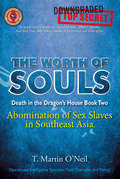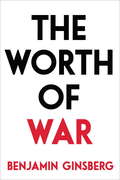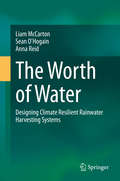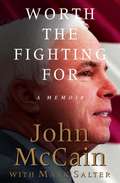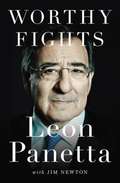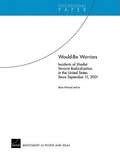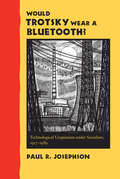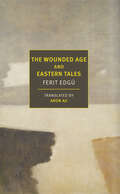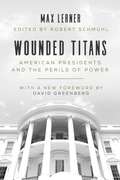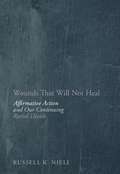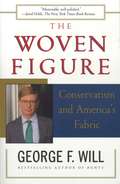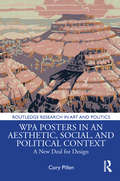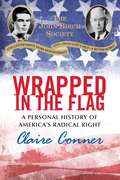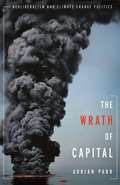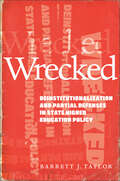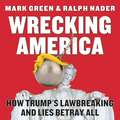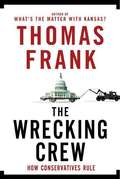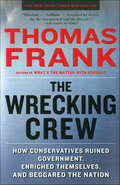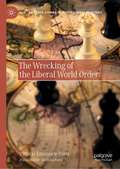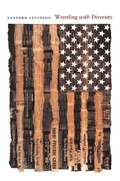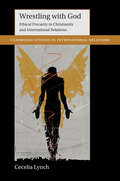- Table View
- List View
The Worth of Souls: Abomination of Sex Slaves in Southeast Asia
by T. Martin O’NeilThe inky, black room and the horrible smells left little doubt this was a dungeon; a wretched hell intended to defeat the spirit and humanity of those it confined. The occupants were children, thrust into the hell they now faced through no act of their own, but by the depraved and morally bankrupt men and women who sold their lives and young bodies to fulfill their own greed. The door cracked open ever so slightly. Into the blackness, a wretch of a man crept. The dim, back-light of the outside hallway showed his skinny, almost bald figure as if it were in a spotlight. His torn, ragged clothes hung on a dirty, pox-scarred body. The rope holding up his bloomer-like pants was untied. His almost toothless, evil grin screamed his intentions. Each child shrank in fear from the sight before them. What had they ever done to deserve this nightmare? Did God hate them this much? Their fears were not sanctioned by governments, but by a depraved humanity. Members of SEAL Team One quietly entered the building after eliminating the feeble resistance of a few untrained guards. If discovered, it meant the SEALS caused all out war between two nations not yet at war for this was an armed invasion. These are the human stories; stories of the love of fellow man. Stories not found in the hate spewing news. Stories instead revealed from downgraded, classified files and told here in The Worth of Souls.
The Worth of War
by Benjamin GinsbergAlthough war is terrible and brutal, history shows that it has been a great driver of human progress. So argues political scientist Benjamin Ginsberg in this incisive, well-researched study of the benefits to civilization derived from armed conflict. Ginsberg makes a convincing case that war selects for and promotes certain features of societies that are generally held to represent progress. These include rationality, technological and economic development, and liberal forms of government. Contrary to common perceptions that war is the height of irrationality, Ginsberg persuasively demonstrates that in fact it is the ultimate test of rationality. He points out that those societies best able to assess threats from enemies rationally and objectively are usually the survivors of warfare. History also clearly reveals the technological benefits that result from war--ranging from the sundial to nuclear power. And in regard to economics, preparation for war often spurs on economic development; by the same token, nations with economic clout in peacetime usually have a huge advantage in times of war. Finally, war and the threat of war have encouraged governments to become more congenial to the needs and wants of their citizens because of the increasing reliance of governments on their citizens' full cooperation in times of war. However deplorable the realities of war are, the many fascinating examples and astute analysis in this thought-provoking book will make readers reconsider the unmistakable connection between war and progress.
The Worth of Water: Designing Climate Resilient Rainwater Harvesting Systems
by Liam McCarton Sean O'Hogain Anna ReidThere is no more fundamental substance to life on earth than water. Three quarter of the Earth’s surface is covered by either saltwater or freshwater, yet millions face a daily struggle to access enough water for survival. The effects of ongoing climate change have expanded the water crisis to areas previously considered water secure. This book addresses the role rainwater harvesting (rwh) can play in developing a resilient water infrastructure that will prove adaptive to climate change. The book features three sections. The first section presents the concepts underpinning a new approach to water infrastructure. The term “the worth of water” was developed to reflect the importance of the social life of water. This encompasses all human relationships with water including the social, cultural, hydrological, political, economic, technical and spiritual. A technology portfolio showcasing the worth of water from the Qanats of the ancient world to the modern Rain Cities is presented. Other concepts discussed include the circular economy of water and the concept of multiple waters for multiple users of multiple qualities. Water and its properties are a function of its peculiar molecular structure and this is illustrated in the book. Rainwater harvesting is considered by the authors as containing an inherent treatment train which functions as a complex water treatment system providing physical, chemical and biological removal mechanisms. Part two presents a new design methodology together with design templates and worked examples for the hydraulic and economic analysis of rwh systems. A state-of-the-art literature review of the potential health implications of utilizing rwh is also presented. The final section of the book discusses how rwh can play a vital role in contributing to achieving the Sustainable Development Goals and to living within the Planetary Boundaries.
Worth Saving: International Diplomacy to Protect the Environment (AESS Interdisciplinary Environmental Studies and Sciences Series)
by Anne EgelstonThis textbook is intended to be used in an upper-level international environmental issues class as part of the American Environmental Studies and Sciences book series. This class is commonly taught at both the undergraduate and graduate level as part of either an environmental studies program, a political science program, or within a policy track of an environmental science program.Given the length of time that negotiations have occurred, a new generation of students and practitioners will need to understand the complex processes that produced many of our environmental treaties. The majority of the students in environmental studies do not have a background in political science. Moving from a political science approach to an interdisciplinary approach will benefit the students by making the material more accessible.As these fields continue to grow and develop, regulatory compliance becomes increasingly important. Thus, this book is aimed at adding a business and industry perspective to this field where appropriate.
Worth the Fighting For: A Memoir
by John Mccain Mark SalterIn 1999, John McCain wrote one of the most acclaimed and bestselling memoirs of the decade, Faith of My Fathers. That book ended in 1972, with McCain's release from imprisonment in Vietnam. This is the rest of his story, about his great American journey from the U.S. Navy to his electrifying run for the presidency, interwoven with heartfelt portraits of the mavericks who have inspired him through the years--Ted Williams, Theodore Roosevelt, visionary aviation proponent Billy Mitchell, Marlon Brando in Viva Zapata!, and, most indelibly, Robert Jordan. It was Jordan, Hemingway's protagonist in For Whom the Bell Tolls, who showed McCain the ideals of heroism and sacrifice, stoicism and redemption, and why certain causes, despite the costs, are ... Worth the Fighting For. After five and a half years as a prisoner of war in Vietnam, naval aviator John McCain returned home a changed man. Regaining his health and flight-eligibility status, he resumed his military career, commanding carrier pilots and serving as the navy's liaison to what is sometimes ironically called the world's most exclusive club, the United States Senate. Accompanying Senators John Tower and Henry "Scoop" Jackson on international trips, McCain began his political education in the company of two masters, leaders whose standards he would strive to maintain upon his election to the U. S. Congress. There, he learned valuable lessons in cooperation from a good-humored congressman from the other party, Morris Udall. In 1986, McCain was elected to the U. S. Senate, inheriting the seat of another role model, Barry Goldwater. During his time in public office, McCain has seen acts of principle and acts of craven self-interest. He describes both extremes in these pages, with his characteristic straight talk and humor. He writes honestly of the lowest point in his career, the Keating Five savings and loan debacle, as well as his triumphant moments--his return to Vietnam and his efforts to normalize relations between the U.S. and Vietnamese governments; his fight for campaign finance reform; and his galvanizing bid for the presidency in 2000. Writes McCain: "A rebel without a cause is just a punk. Whatever you're called--rebel, unorthodox, nonconformist, radical--it's all self-indulgence without a good cause to give your life meaning." This is the story of McCain's causes, the people who made him do it, and the meaning he found. Worth the Fighting For reminds us of what's best in America, and in ourselves.
Worthy Fights
by Jim Newton Leon PanettaThe New York Times-bestselling autobiography of a legendary political and military leader It could be said that Leon Panetta has had two of the most consequential careers of any American public servant in the past fifty years. His first career, beginning as an Army intelligence officer and including a distinguished run as one of the most powerful and respected members of Congress, lasted thirty-five years and culminated in his transformational role as budget czar and White House chief of staff in the Clinton administration. But after a brief "retirement," he returned to public service in 2009 as the CIA director who led the intelligence war that killed Osama Bin Laden and then became the U.S. secretary of defense, inheriting two troubled wars in a time of austerity and painful choices. Like his career, Worthy Fights is a reflection of Panetta's values. It is also a testament to a lost kind of political leadership that favors progress and duty to country over partisanship.Leon Panetta calls them as he sees them in Worthy Fights. Suffused with its author's decency and common sense, the book is an inspiring American success story, a great political memoir, and a revelatory view onto many of the defining figures and events of our time.From the Trade Paperback edition.t most can be prevented with courage and foresight.As always, Panetta calls them as he sees them in Worthy Fights. Suffused with its author's decency and stubborn common sense, the book is an epic American success story, a great political memoir, and a revelatory view onto many of the great figures and events of our time.
Worthy Fights
by Jim Newton Leon PanettaThe inspiring and revelatory autobiography of the defense secretary and CIA director who led the intelligence war that killed Bin Laden, among many important roles in a legendary careerIt could be said that Leon Panetta has had two of the most consequential careers of any American public servant in the past fifty years. His first career, beginning as an army intelligence officer and including a distinguished run as one of Congress's most powerful and respected members, lasted thirty-five years and culminated in his transformational role as Clinton's budget czar and White House chief of staff. He then "retired" to establish the Panetta Institute with his wife of fifty years, Sylvia; to serve on the Iraq Study Group; and to protect his beloved California coastline. But in 2009, he accepted what many said was a thankless task: returning to public office as the director of the CIA, taking it from a state of turmoil after the Bush-era torture debates and moving it back to the vital center of America's war against Al Qaeda, including the campaign that led to the killing of Osama bin Laden. And then, in the wake of bin Laden's death, Panetta became the U.S. secretary of defense, inheriting two troubled wars in a time of austerity and painful choices.Like his career, Worthy Fights is a reflection of Panetta's values. It is imbued with the frank, grounded, and often quite funny spirit of a man who never lost touch with where he came from: his family's walnut farm in beautiful Carmel Valley, California. It is also a testament to a lost kind of political leadership, which favors progress and duty to country over partisanship. Panetta is a Democrat who pushed for balanced budgets while also expanding care for the elderly and sick; a devout Catholic who opposes the death penalty but had to weigh every drone strike from 2009 through 2011. Throughout his career, Panetta's polestar has been his belief that a public servant's real choice is between leadership or crisis. Troubles always come about through no fault of one's own, but most can be prevented with courage and foresight.As always, Panetta calls them as he sees them in Worthy Fights. Suffused with its author's decency and stubborn common sense, the book is an epic American success story, a great political memoir, and a revelatory view onto many of the great figures and events of our time.
Would-Be Warriors
by Brian Michael JenkinsBetween 9/11 and the end of 2009, 46 publicly reported cases of domestic radicalization and recruitment to jihadist terrorism occurred in the United States, 13 of them in 2009. Most of the would be jihadists recruited themselves into the terrorist role, assisting foreign terrorist organizations, joining jihad fronts abroad, and plotting attacks. The terrorist threat has pushed law enforcement toward prevention rather than post-event apprehension.
Would Trotsky Wear a Bluetooth?: Technological Utopianism under Socialism, 1917–1989
by Paul R. JosephsonAfter visiting Russia in 1921, the journalist Lincoln Steffens famously declared, "I have seen the future, and it works." Steffens referred to the social experiment of technological utopianism he found in the Soviet Union, where subway cars and farm tractors would carry the worker and peasant—figuratively and literally—into the twentieth century. Believing that socialism and technology together created a brave new world, Boleslaw Bierut of Poland and Kim Il Sung of North Korea—and other leaders—joined Russia’s Vladimir Lenin and Leon Trotsky in embracing big technology with a verve and conviction that rivaled the western world's.Paul R. Josephson here explores these utopian visions of technology—and their unanticipated human and environmental costs. He examines the role of technology in communist plans and policies and the interplay between ideology and technological development. He shows that while technology was a symbol of regime legitimacy and an engine of progress, the changes it spurred were not unequivocally positive. Instead of achieving a worker’s paradise, socialist technologies exposed the proletariat to dangerous machinery and deadly pollution; rather than freeing women from exploitation in family and labor, they paradoxically created for them the dual—and exhausting—burdens of mother and worker. The future did not work. The fall of the Soviet Union in 1991 marked the end of communism’s self-proclaimed glorious quest to "reach and surpass" the West. Josephson’s intriguing study of how technology both helped and hindered this effort asks new and important questions about the crucial issues inextricably linked with the development and diffusion of technology in any sociopolitical system.
The Wounded Age and Eastern Tales
by Ferit EdgüOne of Turkey's most celebrated writers explores themes of violence, otherness, and exile through a thrilling hybrid of poetry and prose that paints a vivid picture of Turkey's conflict-torn lands.In the two books paired here, translated into English for the first time, the great Turkish writer Ferit Edgü represents complex social and political realities with startling lyricism. The Wounded Age features a newspaper reporter from Istanbul, assigned to write about ethno-national violence in the mountains of eastern Turkey. Like the narrators in Eastern Tales, he is a stranger in a region where a buried history—the state&’s violence against Armenians, Greeks, and Assyrians—continues uninterrupted with the subjugation of the Kurds. Language in this place, especially the language of outsiders, cannot be trusted. In the story &“Interview,&” an old villager tells the narrator, &“Make our photograph,&” and adds, &“Send us the pictures. No need to write us letters.&” The minimal tales Edgü tells are vivid pictures of life in the East—a house in ruins, an empty crib, wolves howling in the hills—and transcriptions of living voices. The reporter in The Wounded Age has no illusions that his story will stop the bloodletting; instead, he goes east because he knows he must open his eyes and unstop his ears.
Wounded Titans: American Presidents and the Perils of Power
by David Greenberg Max Lerner Robert SchmuhlA collection of essays on power and the American presidency from a journalist who personally knew the men inside the Oval Office. An academic and journalist, Max Lerner dedicated his life to studying American presidents. He not only wrote about the men in the Oval Office, but knew them personally, from Franklin D. Roosevelt to Bill Clinton. Lerner believed that the nature of the office transforms presidents into titans, but wounded titans, bowed and sometimes broken by forces, fate, destiny, or history, that lie beyond their control. Wounded Titans compiles Lerner’s essays on the presidency along with his presidential portraits and campaign journalism. This collection includes Lerner’s thoughts on Roosevelt’s attempt to pack the Supreme Court; Truman’s efforts to manhandle the steel industry; Eisenhower’s belief that he could control the military-industrial complex; Kennedy’s hyperactive libido and recklessness; and Nixon’s conviction that he could manipulate political process. Lerner’s personal relationship with the presidents gives these essays “a powerful immediacy” and “he is unflinching in his assessment of their effectiveness or lack thereof while in office” (Kirkus Reviews). Updated with a new foreword, Wounded Titans is the complete collection of Max Lerner’s writings on the presidency and American presidents.
Wounds That Will Not Heal
by Russell K NieliRacial preference policies first came on the national scene as a response to black poverty and alienation in America as dramatically revealed in the destructive urban riots of the late 1960s. From the start, however, preference policies were controversial and were greeted by many, including many who had fought the good fight against segregation and Jim Crow to further a color-blind justice, with a sense of outrage and deep betrayal. In the more than forty years that preference policies have been with us little has changed in terms of public opinion, as polls indicate that a majority of Americans continue to oppose such policies, often with great intensity.In Wounds That Will Not Heal political theorist Russell K. Nieli surveys some of the more important social science research on racial preference policies over the past two decades, much of which, he shows, undermines the central claims of preference policy supporters. The mere fact that preference policies have to be referred to through an elaborate system of euphemisms and code words-- "affirmative action," "diversity," "goals and timetables," "race sensitive admissions"-- tells us something, Nieli argues, about their widespread unpopularity, their tendency to reinforce negative stereotypes about their intended beneficiaries, and their incompatibility with core principles of American justice. Nieli concludes with an impassioned plea to refocus our public attention on the "truly disadvantaged" African American population in our nation's urban centers--the people for whom affirmative action policies were initially instituted but whose interests, Nieli charges, were soon forgotten as the fruits of the policies were hijacked by members of the black and Hispanic middle class. Few will be able to read this book without at least questioning the wisdom of our current race-based preference regime, which Nieli analyses with a penetrating gaze and an eye for cant that will leave few unmoved.
The Woven Figure
by George F. WillSwatches From The Century's End ...I cannot deny my past to which my self is wed, the woven figure cannot undo its thread. Louis MacNeice, "Valediction" These words express a truth of conservatism that has discomfited conservatives in the years covered by this volume. This collection of columns shows how, in the mid-1990s, conservatives fancied themselves poised to conduct a revolution, a radical reorientation of politics and governance. But in the late 1990s, they have discovered how resistant a complex nation is to being undone and rewoven. In this volume, George F. Will, distinguished political columnist and cultural critic, examines many episodes of the conservative tribulations and the liberal accommodations to the new political landscape. These writings present a map of the landscape, a guide for people perplexed by the gap between contemporary political theories and practices. With his customary linguistic flair and acerbic wit, Mr. Will tackles a wide range of subjects, including political correctness on college campuses; extreme fighting; the 1996 presidential campaign; judicial activism; ESPN; and Corvettes. These writings are history written on deadline, and together they constitute a richly woven tapestry of our era.
WPA Posters in an Aesthetic, Social, and Political Context: A New Deal for Design (Routledge Research in Art and Politics)
by Cory PillenThis book examines posters produced by the Works Progress Administration (WPA), a federal relief program designed to create jobs in the United States during the Great Depression. Cory Pillen focuses on several issues addressed repeatedly in the roughly 2,200 extant WPA posters created between 1935 and 1943: recreation and leisure, conservation, health and disease, and public housing. As the book shows, the posters promote specific forms of knowledge and literacy as solutions to contemporary social concerns. The varied issues these works engage and the ideals they endorse, however, would have resonated in complex ways with the posters’ diverse viewing public, working both for and against the rhetoric of consensus employed by New Deal agencies in defining and managing the relationship between self and society in modern America. This book will be of interest to scholars in design history, art history, and American studies.
Wrapped in the Flag: A Personal History of America's Radical Right
by Claire ConnerA narrative history of the John Birch Society by a daughter of one of the infamous ultraconservative organization's founding fathers Long before the rise of the Tea Party movement and the prominence of today's religious Right, the John Birch Society, first established in 1958, championed many of the same radical causes touted by ultraconservatives today, including campaigns against abortion rights, gay rights, gun control, labor unions, environmental protections, immigrant rights, social and welfare programs, the United Nations, and even water fluoridation. Worshipping its anti-Communist hero Joe McCarthy, the Birch Society is perhaps most notorious for its red-baiting and for accusing top politicians, including President Dwight Eisenhower, of being Communist sympathizers. It also labeled John F. Kennedy a traitor and actively worked to unseat him. The Birch Society boasted a number of notable members, including Fred Koch, father of Charles and David Koch, who are using their father's billions to bankroll fundamentalist and right-wing movements today. The daughter of one of the society's first members and a national spokesman about the society, Claire Conner grew up surrounded by dedicated Birchers and was expected to abide by and espouse Birch ideals. When her parents forced her to join the society at age thirteen, she became its youngest member of the society. From an even younger age though, Conner was pressed into service for the cause her father and mother gave their lives to: the nurturing and growth of the JBS. She was expected to bring home her textbooks for close examination (her mother found traces of Communist influence even in the Catholic school curriculum), to write letters against "socialized medicine" after school, to attend her father's fiery speeches against the United Nations, or babysit her siblings while her parents held meetings in the living room to recruit members to fight the war on Christmas or (potentially poisonous) water fluoridation. Conner was "on deck" to lend a hand when JBS notables visited, including founder Robert Welch, notorious Holocaust denier Revilo Oliver, and white supremacist Thomas Stockheimer. Even when she was old enough to quit in disgust over the actions of those men, Conner found herself sucked into campaigns against abortion rights and for ultraconservative presidential candidates like John Schmitz. It took momentous changes in her own life for Conner to finally free herself of the legacy of the John Birch Society in which she was raised. In Wrapped in the Flag, Claire Conner offers an intimate account of the society --based on JBS records and documents, on her parents' files and personal writing, on historical archives and contemporary accounts, and on firsthand knowledge--giving us an inside look at one of the most radical right-wing movements in US history and its lasting effects on our political discourse today.
The Wrath of Capital: Neoliberalism and Climate Change Politics (New Directions in Critical Theory #48)
by Adrian ParrAlthough climate change has become the dominant concern of the twenty-first century, global powers refuse to implement the changes necessary to reverse these trends. Instead, they have neoliberalized nature and climate change politics and discourse, and there are indications of a more virulent strain of capital accumulation on the horizon. Adrian Parr calls attention to the problematic socioeconomic conditions of neoliberal capitalism underpinning the world's environmental challenges, and she argues that, until we grasp the implications of neoliberalism's interference in climate change talks and policy, humanity is on track to an irreversible crisis.Parr not only exposes the global failure to produce equitable political options for environmental regulation, but she also breaks down the dominant political paradigms hindering the discovery of viable alternatives. She highlights the neoliberalization of nature in the development of green technologies, land use, dietary habits, reproductive practices, consumption patterns, design strategies, and media. She dismisses the notion that the free market can solve debilitating environmental degradation and climate change as nothing more than a political ghost emptied of its collective aspirations. Decrying what she perceives as a failure of the human imagination and an impoverishment of political institutions, Parr ruminates on the nature of change and existence in the absence of a future. The sustainability movement, she contends, must engage more aggressively with the logic and cultural manifestations of consumer economics to take hold of a more transformative politics. If the economically powerful continue to monopolize the meaning of environmental change, she warns, new and more promising collective solutions will fail to take root.
Wrecked: Deinstitutionalization and Partial Defenses in State Higher Education Policy
by Barrett J. TaylorHigher education is a central institution in U.S. democracy. In the 2010s, however, many states that spent previous decades building up their higher education systems began to tear them down. Growing hostility toward higher education reflected changing social forces that remade the politics of U.S. higher education. The political Right became increasingly reliant on angry white voters as higher education became more racially diverse. The Republican party became more closely connected to extremely wealthy donors as higher education became more costly. In Wrecked, Barrett J. Taylor shows how these social changes set a collision course for the Right and higher education. These attacks fed a policy agenda of deinstitutionalization, which encompassed stark divestment from higher education but was primarily characterized by an attack on the institution’s social foundation of public trust. In response to these attacks, higher education officials have offered a series of partial defenses that helped higher education to cope in the short-term but did nothing to defend the institution itself against the long-term threat of declining public trust. The failure to address underlying issues of mistrust allowed conflict to escalate to the point at which many states are now wrecking their public higher education systems. Wrecked offers a unique and compelling perspective linking higher education policymaking to broader social and political forces acting in the twenty-first century.
Wrecking America: How Trump's Lawbreaking and Lies Betray All
by Mark Green Ralph Nader"Read Fake President….This book can help us replace Trump with truth." —Gloria Steinem "Terrific new book. Fake President informs as it entertains." --Laurence Tribe An incisive & witty look at the cost of lies on American livesWrecking America is most up-to-date look at Trump's anything-goes "Fascism 2.0" presidency and campaign. It reveals how Trump's daily "twistifications" (a Jefferson coinage) are killing tens of thousands of Americans and millions of American jobs, polluting the air and public debate, selling out his country for personal gain...and trying to "Make the Confederacy Great Again," as he preoccupies himself with golfing, seething, and tweeting. By four-time presidential candidate Ralph Nader and bestselling author Mark Green, Wrecking America organizes Trump's lies and lawbreaking issue-by-issue—focusing on Covid-19 and racial protests. This scathing, witty, accessible paperback is the last up-to-date book on "the Lyin' King" keyed to General Election voters and post-election America.This November will test our 231-year experiment in self-governance like no time since 1860 and 1932. Will it be re-election or realignment? A Fascism for the few or Democracy for all? The wrecking ball of American Brownshirts or a new progressive backlash and era?
The Wrecking Crew: How Conservatives Rule
by Thomas Frank[From the Book jacket[ FROM THE BESTSELLING AUTHOR OF WHAT'S THE MATTER WITH KANSAS?, A JAW-DROPPING INVESTIGATION OF THE DECADES OF DELIBERATE-AND LUCRATIVE CONSERVATIVE MISRULE In his previous book, Thomas Frank explained why working America votes for politicians who reserve their favors for the rich. Now, in The Wrecking Crew, Frank examines the blundering and corrupt Washington those politicians have given us. Casting his eye back to the early days of the conservative revolution, Frank describes the rise of a ruling coalition dedicated to dismantling government. But rather than cutting down the big government they claim to hate, conservatives have simply sold it off, turning public policy into a private-sector bidding war. Washington itself has been remade into a golden landscape of super-wealthy suburbs and gleaming lobbyist headquarters-the wages of government-by entrepreneurship that has been practiced so outrageously by figures such as Jack Abramoff. It is no coincidence, Frank argues, that the same politicians who guffaw at the idea of effective government have installed a regime in which incompetence is the rule. Nor will the country easily shake off the consequences of deliberate misgovernment through the usual election remedies. Obsessed with achieving a lasting victory, conservatives have taken pains to enshrine the free market as the permanent creed of state.
The Wrecking Crew: How Conservatives Ruined Government, Enriched Themselves, and Beggared the Nation
by Thomas FrankFrom the author of the landmark bestseller What's the Matter with Kansas?, a jaw-dropping investigation of the decades of deliberate—and lucrative—conservative misruleIn his previous book, Thomas Frank explained why working America votes for politicians who reserve their favors for the rich. Now, in The Wrecking Crew, Frank examines the blundering and corrupt Washington those politicians have given us. Casting his eyes from the Bush administration's final months of plunder to the earliest days of the Republican revolution, Frank describes the rise of a ruling coalition dedicated to dismantling government. But rather than cutting down the big government they claim to hate, conservatives have simply sold it off, deregulating some industries, defunding others, but always turning public policy into a private-sector bidding war. Washington itself has been remade into a golden landscape of super-wealthy suburbs and gleaming lobbyist headquarters—the wages of government-by-entrepreneurship practiced so outrageously by figures such as Jack Abramoff.It is no coincidence, Frank argues, that the same politicians who guffaw at the idea of effective government have installed a regime in which incompetence is the rule. Nor will the country easily shake off the consequences of deliberate misgovernment through the usual election remedies. Obsessed with achieving a lasting victory, conservatives have taken pains to enshrine the free market as the permanent creed of state.Stamped with Thomas Frank's audacity, analytic brilliance, and wit, The Wrecking Crew is his most revelatory work yet—and his most important.
The Wrecking of the Liberal World Order (Palgrave Studies in International Relations)
by Vittorio Emanuele ParsiThe ‘Liberal World Order’ (LWO) is today in crisis. But what explains this crisis? Whereas its critics see it as the unmasking of Western hypocrisy, its longstanding proponents argue it is under threat by competing illiberal projects. This book takes a different stance: neither internal hypocrisy, nor external attacks explain the decline of the LWO – a deviation from its original lane does. Emerged as a project aiming to harmonize state sovereignty and the market, through the promotion of liberal democracy domestically, and free trade and economic cooperation internationally, the LWO was hijacked in the 1980s: market forces overshadowed democratic forces, thus disfiguring the LWO into a Neoliberal Global Order. The book advocates for a revival of its original intellectual premises, that in the aftermath of World War II marked the zenith of political modernity.
Wrestling With an Angel: Power, Morality, and Jewish Identity
by Ehud Luz Michael SwirskyAfter the Bar Kokhba revolt (132-135 CE) and the eradication of all trace of Jewish political independence in Palestine, Jews gave little thought to questions of war. Long exile freed them from the sharp moral dilemmas con¬fronted by any polity that is compelled to use force to defend itself. Jews considered warfare to be the ''craft of Esau,'' that is, a matter for the gentiles, at least until such time as the Messiah would come. The Jews --''Jacob'' -- took no interest in armed conflict except insofar as it might impinge upon their fate as a minority living under foreign rule.
Wrestling with Democracy
by Dennis PilonThough sharing broadly similar processes of economic and political development from the mid-to-late nineteenth century onward, western countries have diverged greatly in their choice of voting systems: most of Europe shifted to proportional voting around the First World War, while Anglo-American countries have stuck with relative majority or majority voting rules. Using a comparative historical approach, Wrestling with Democracy examines why voting systems have (or have not) changed in western industrialized countries over the past century.In this first single-volume study of voting system reform covering all western industrialized countries, Dennis Pilon reviews national efforts in this area over four timespans: the nineteenth century, the period around the First World War, the Cold War, and the 1990s. Pilon provocatively argues that voting system reform has been a part of larger struggles over defining democracy itself, highlighting previously overlooked episodes of reform and challenging widely held assumptions about institutional change.
Wrestling with Diversity
by Sanford Levinson"Diversity" has become a mantra within discussions of university admissions policies and many other arenas of American society. In the essays collected here, Sanford Levinson, a leading scholar of constitutional law and American government, wrestles with various notions of diversity. He begins by explaining why he finds the concept to be almost useless as a genuine guide to public policy. Discussing affirmative action in university admissions, including the now famous University of Michigan Law School case, he argues both that there may be good reasons to use preferences--including race and ethnicity--and that these reasons have relatively little to do with any cogently developed theory of diversity. Distinguished by Levinson's characteristic open-mindedness and willingness to tease out the full implications of various claims, each of these nine essays, written over the past decade, develops a case study focusing on a particular aspect of public life in a richly diverse, and sometimes bitterly divided, society. Although most discussions of diversity have focused on race and ethnicity, Levinson is particularly interested in religious diversity and its implications. Why, he asks, do arguments for racial and ethnic diversity not also counsel a concern to achieve religious diversity within a student body? He considers the propriety of judges drawing on their religious views in making legal decisions and the kinds of questions Senators should feel free to ask nominees to the federal judiciary who have proclaimed the importance of their religion in structuring their own lives. In exploring the sense in which Sandy Koufax can be said to be a "Jewish baseball player," he engages in broad reflections on professional identity. He asks whether it is desirable, or even possible, to subordinate merely "personal" aspects of one's identity--religion, political viewpoints, gender--to the impersonal demands of the professional role. Wrestling with Diversity is a powerful interrogation of the assumptions and contradictions underlying public life in a multicultural world.
Wrestling with God: Ethical Precarity in Christianity and International Relations (Cambridge Studies in International Relations)
by Cecelia LynchContrary to charges of religious “dogma,” Christian actors in international politics often wrestle with the lack of a clear path in determining what to do and how to act, especially in situations of violence and when encountering otherness. Lynch argues that it is crucial to recognise the ethical precarity of decision-making and acting. This book contextualizes and examines ethical struggles and justifications that key figures and movements gave during the early modern period of missionary activity in the Americas; in the interwar debates about how to act vis-à-vis fascism, economic oppression and colonialism in a “secular” world; in liberation theology's debates about the use of violence against oppression and bloodshed; and in contemporary Christian humanitarian negotiations of religious pluralism and challenges to the assumptions of western Christianity. Lynch explores how the wrestling with God that took place in each of these periods reveals ethical tensions that continue to impact both Christianity and international relations.
